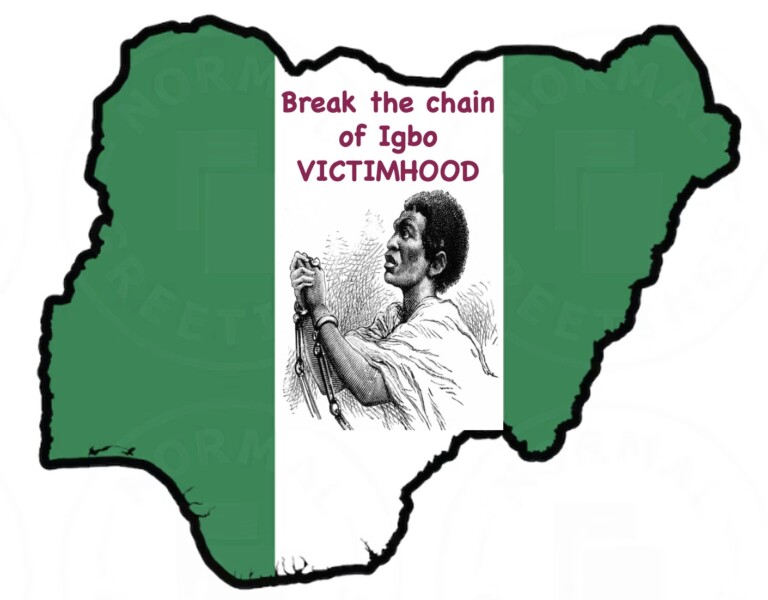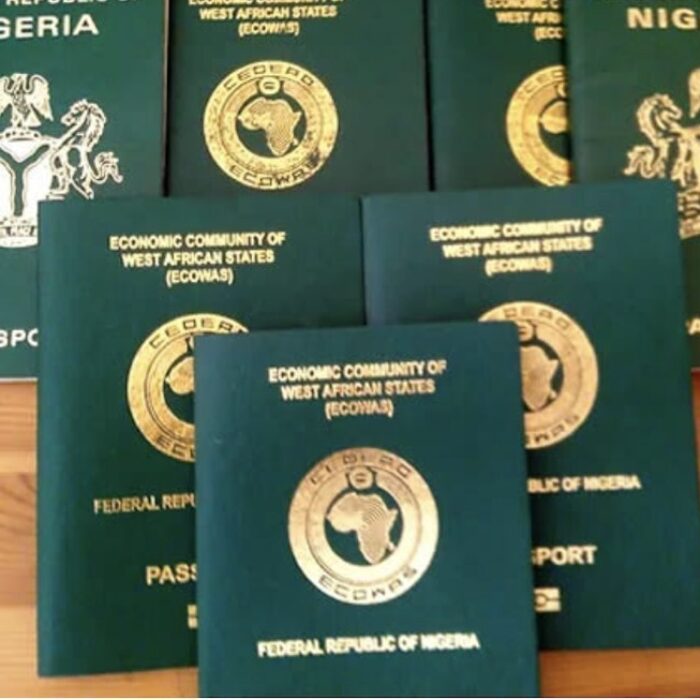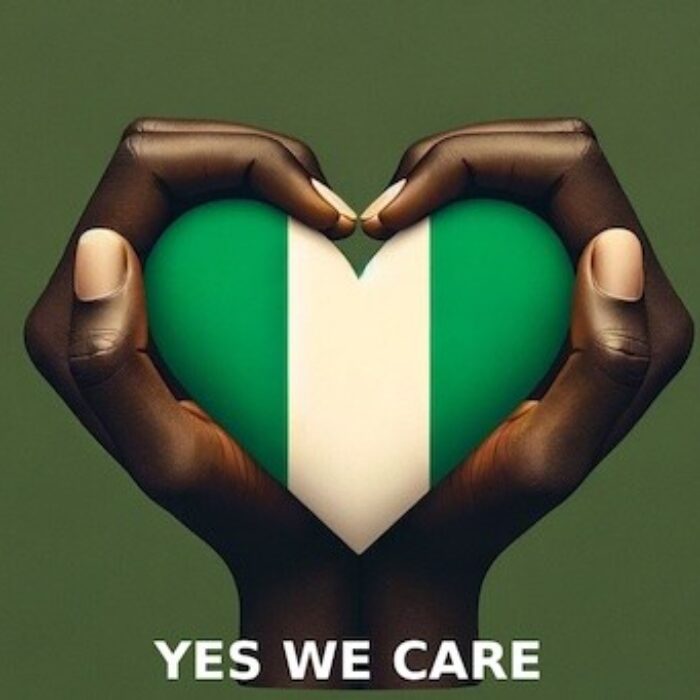By Nnaoke Ufere, PhD
As the Igbos find themselves at a critical juncture in history, their choices today will shape their future. They stand before a pivotal decision, with two distinct paths before them: one characterized by victimhood and pessimism, and the other fueled by empowerment and optimism.
The first path, which is the focus of my essay, is marred by a fixation on distorted narratives of Igbophobia, the presence of Igbo-haters, disenfranchisement, and marginalization. These narratives only serve to breed grievance, despair, and a lack of accountability.
On the contrary, the alternative path presents a promising future for the Igbo people, rooted in their intellectual prowess, resourcefulness, ingenuity, and hard work.
Regrettably, our recent survey findings indicate that 75% of Igbo participants believe that the Igbo community in Nigeria experiences ongoing marginalization, discrimination, or disenfranchisement in various aspects. These include presidential candidate nominations (the APC and PDP), top federal appointments, job opportunities, economic prospects, and the distribution of infrastructure resources.
In addition, an extensive analysis of Nigerian media content also revealed that the term “marginalization” was associated with the Igbo community 72% of the time.
Furthermore, it was observed that many Igbos associate their victim status with the consequences of the Biafra War and subsequent unjust actions taken by the Nigerian government to impede their advancement in the postwar period.
Moreover, an overwhelming majority (88%) of Igbo people consider themselves victims, enduring discrimination or marginalization by their fellow Nigerians and some state governments solely because of their Igbo heritage.
The prevalence of this victim mentality among the Igbos deeply concerns me. I refer to this harmful mindset as “Igbo victimhood syndrome,” as it has permeated Igbo identity and character, resulting in negative outcomes such as blame-shifting, grievance-peddling, self-pity, and despair.
It is disheartening to see the transformation of the Igbos, who were once a proud, confident, dignified, and courageous people, into victims of a detrimental culture of victimhood. This culture may hinder our capacity for self-examination, accountability, and understanding of others’ viewpoints.
Unfortunately, Igbo victimhood syndrome has become deeply ingrained in the Igbo narrative, sustained by a constant stream of media opinions, pseudo-academic literature, and political discussions surrounding “Igbo Marginalization“, Igbophobes and Igbo-haters.” These narratives are seen as lingering effects of the Biafra war and postwar injustices.
While the atrocities and injustices of the past cannot be ignored, it is time for the Igbos to move forward and embrace a new, self-assured identity. The culture of victimhood only impedes progress and must be eradicated from the Igbo narrative and character.
However, acknowledging our responsibility in overcoming the traumas of the Biafra War and postwar injustices, and growing from these experiences, does not negate the fact that we were victimized and marginalized, nor does it absolve those who perpetrated these acts. What I mean to convey is that our ultimate revenge against oppressors and the greatest reward for our oppression is our unwavering progress and success.
Unfortunately, Igbo leaders contribute to this culture by emphasizing the war’s perpetrators and consequences, fostering fear and grievances among young people.
These leaders also exploit victimhood for their own political interests, perpetuating a sense of constant siege and manufacturing enemies to shift blame. However, it is important to recognize that these external enemies are not responsible for internal issues such as corruption, lack of infrastructure, and violence in Igboland. Holding them accountable for such problems is misguided.
The Negative Effects of Victimhood Syndrome
The victimhood mentality has negative effects, especially among Igbo youth, posing risks to Igbo future. Today, blaming others for personal misfortune is common among our youth, with a majority attributing their underperformance to victimization. This lack of personal accountability hinders their growth, learning, and ability to reach their full potential.
Furthermore, the excessive focus on victimhood narratives distracts us from addressing urgent issues within the Igbo community, such as ineffective leadership, corruption, internal Igbo-on-Igbo crimes, economic stagnation, unemployment, food insecurity, and crumbling infrastructure. It is crucial that we hold our leaders accountable for their failures rather than solely blaming those we perceive as our oppressors.
Lastly, victimhood syndrome perpetuates a sense of persecution, leaving Igbos emotionally vulnerable and prone to lashing out, even in situations that don’t warrant it. This mindset obstructs collaboration and consensus-building with others. If we aim to succeed in presidential politics and sustain advantages in business, it is crucial that we abandon the current “us versus them” mentality.
Therefore, to reach full potential, we must reject the victimhood mentality and prioritize personal accountability, internal transformation, and celebrating success stories. We must break free from the shackles of victimhood and take control of our destiny to thrive in Nigeria. This shift in mindset is crucial for individual empowerment, collective action, and accountability, leading to a brighter future for the Igbos.
New Igbo Consciousness
In my previous policy paper, “An Urgent Call for Igbo Rebirth: A Blueprint for Freedom, Equality, and Security,” which garnered significant attention and support from Igbo state governors, Ohanaeze Ndigbo and Diaspora Igbos, I presented comprehensive policies and fiscal recommendations to pave the way for the second path, leading to progress and prosperity.
I emphasized in the paper that true Igbo emancipation and triumph over past and present victimization require a relentless focus on entrepreneurial and technological advancements, and investments in infrastructure development, internal security, economic development, food security, and community prosperity.
In his inaugural speech as the new President General of Ohanaeze Ndigbo, Chief Emmanuel C. Iwuanyanwu, identified industrialization and economic development, among others, as his top strategic priorities. I endorse his goals and expect concrete results.
It is essential for the Igbos to recognize their power and potential as a highly educated and innovative group. A victimhood narrative is unnecessary and counterproductive, and only serves to diminish the true potential of the Igbo people.
The Igbo principle of “ọganihu,” encapsulating the pursuit of progress, implores us not to succumb to victimhood but to rise above and embrace a brighter future. It demands that we reject blame, grievance, and complaint, and instead transcend victimhood to achieve victory.
Our youth hold the key to our future. To inspire and empower the younger generation who did not witness the war, it is crucial for Ndigbo to reject the victimhood narrative and instead share stories that uplift and inspire. These stories should highlight the bravery, strength, courage, resilience, inventiveness, and scholarship of the Igbo people, promoting hope rather than despair, bitterness, and grievance. It is important to emphasize the Igbo people’s ability to survive and thrive amidst genocide, pogroms, hunger, disease, bombs, and adversity.
When sharing the Biafra war stories, it is also essential to avoid exaggeration, address fears, and promote respect for all individuals, regardless of differences. By sharing the lessons learned from the war, we can prevent another one and teach Igbo youth to be vigilant against ethnoreligious extremism and bigotry, which is crucial for the survival of the Igbo people.
In conclusion, by acknowledging our inherent talents as risk-taking innovators and entrepreneurs, celebrating stories of success and resilience, and rejecting the victimhood mentality, we have the potential to thrive and achieve success, regardless of the prevailing national circumstances or the identity of its leader.





